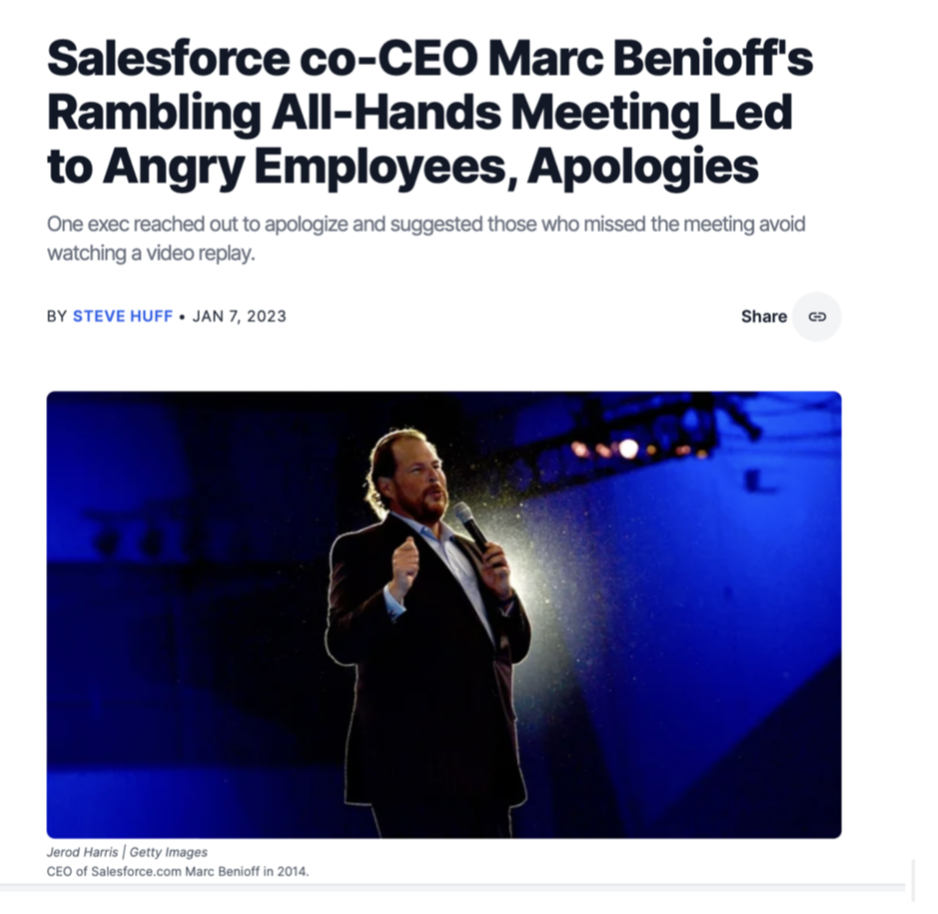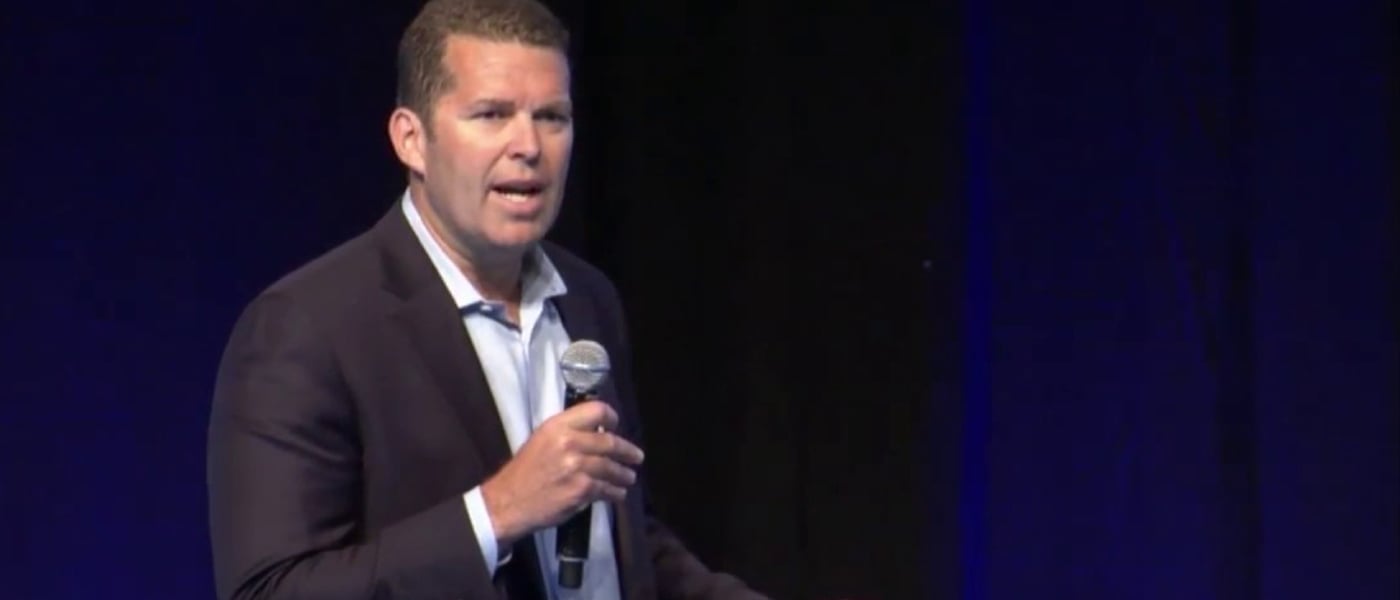Every company event matters, so it’s always important that the agenda and speakers are exactly right. But when it comes to all-hands meetings, nailing the agenda and speaker is code red critical.
In fact, of all corporate event types that exist, all-hands meetings are matched only by customer conferences as the events that have zero margin for error with the speaker choice and agenda.
The reason, of course, is because the audience for all-hands meetings is your entire company. Not to scare you, but an all-hands that misfires can destroy your company culture, investor confidence, or worse.
No pressure.
Marc Benioff’s all-hands meeting for Salesforce this year made headlines, and not the good kind. It’s never easy to talk about layoffs, but Benioff’s bungled talk infuriated employees. It also set off a firestorm of bad news for Salesforce and shone a spotlight on bigger problems within the company, including a lack of transparency and communication.

“The Outline” ran an article a few years back titled, “How the all-hands meeting became a way for bosses to give you the middle finger.” The piece examined the culture of Silicon Valley companies that have seen all-hands meetings slide from a selling point for transparency when they were startups to a tool for destruction after they became giants.
“In the last year alone, there have been leaks from all-hands meetings at Amazon, Apple, Facebook, Google, Uber, WeWork, and Github, about issues such as layoffs, morale, bad press, weak sales, and contracts with certain government agencies,” the article observed. “The all-hands meeting, a creation of the very Silicon Valley ethos of solidarity and the free exchange of ideas, has evolved to be one of its greatest adversaries.”
On the other hand, an all-hands meeting that is done right can set off an upwards spiral of success that can carry your company through the whole year.
So clearly, the decision about a speaker for your all-hands meeting is vital.
Against this backdrop, there’s this: Sometimes, the CEO decides that they’re the best person for the job.
Hmmm.
Look, there are times when the CEO as your speaker makes sense. But there are other times when an outside voice is what an all-hands really needs.
So when should you frame an all-hands meeting around a speaker instead of your CEO?
There are exactly two reasons that companies should hire a speaker for an all-hands meeting:
Reason #1 to hire a speaker for an all-hands: You hire a fun speaker to motivate, inspire, and reward your employees
When things are going well and a company feels that it’s time to reward everyone for their hard work, they might hire a speaker that will delight and excite the team. Now may be the time to bring in a crowd pleaser who has name recognition and a great message.
The right person might have relevance to every age group. Maybe they’re a nostalgia hire who spurs flashbacks to times gone by. Maybe they bring some novelty value and the ability to elicit warm and fuzzies across the entire company.
For example, we booked Magic Johnson for one company’s all-hands. He was a giant (literally) hit.
Magic delivers a great combo platter of inspiration, and most people can connect with him in some way. He represents the world of sports, business, charity, and community. And, above all, Magic is a phenomenal speaker.
Another great speaker I’ve booked in this category is Mayim Bialek. Some generations know her as “Blossom,” others from “The Big Bang Theory,” and older generations know her from all their “Jeopardy” watching. Big hit.
Some companies might turn to an athlete or coach from a winning super bowl team to electrify their all-hands. Or they might hire the leader of the diving crew that saved all those kids in the Thailand cave.
All of these may be great ideas, but they’re not necessarily good speakers. And therein lies the potential problem with this kind of speaker.
Also read: DON’T BLOW YOUR INTERNAL EVENT BUDGET ON A CELEBRITY SPEAKER
One company I worked with hosts a giant all-hands every year. It’s the kind of buzzy team-building event where everyone grabs drinks afterwards, and the company likes to hire a big name to rev up the crowd.
But half the time the speaker falls flat.
Sometimes these speakers bomb because they’re not actually good speakers.
Other times, it’s because they don’t hold any sway over a big chunk of the audience.

Which brings me to the topic of relevance.
Once upon a time, we all shared the same celebrity universe and it was easy to identify the marquee figures who could jolt an entire audience. Nowadays, in our fractured digital universe, we all orbit in different cultural spheres.
With such segmented audiences, there are fewer idols that we all care about, and finding those rare gems is tough. So picking a crowd pleaser has become a personal choice that may only be relevant to a slice of the audience.
The problem is that many event planners don’t realize that the speaker that dazzles THEIR imagination may not hold a whit of interest to much of the audience.
My advice to planners: Do not assume.
Choosing a popular speaker should not be a wild guessing game. Do the work of understanding your company’s tastes and make decisions based on data, not your gut.
How? Amass a knowledge base around what will truly interest your audience and speak to the vibe of your employee base. Create polls, conference surveys, or other touch points throughout the year that help you build data around topics and speakers.
When there’s a spirit of group participation and engagement, your attendees will feel invested in your event and likelier to care.
But beware: don’t confuse marketing data with employee data, because the wrong data can also backfire. Some event planners get fixated on who has the top 10 TED talk or who has the most followers. It doesn’t mean they’re going to be good speakers.
Reason #2 to hire a speaker for an all-hands: Bring in an outside voice to underscore the main message of the meeting.
This is a much taller order than just finding someone fun. And it’s especially essential that you do your due diligence to nail your speaker choice here.
Sample scenario: Your company has just been bought and the staff is scared and wondering what this means for them. Will there be layoffs? What will the new direction look like?
The all-hands meeting at this moment is critical. The outside voice that you bring in can make or break morale, and with that the momentum to successfully move forward.
The wrong speaker might come across as glib and alienate your audience. The right speaker can get your team bought-in to a new chapter, and even excited and inspired to overcome the challenges ahead.
In this fraught moment, event planners might be tempted to hire inspirational speakers who have courageously navigated new frontiers. The obvious choices are often heroic astronauts, mountain climbers, athletes, or military leaders.
But all too often, I have seen companies hire these people and end up with a generic speech that leaves the audience bored to tears or feeling patronized.
The hard truth is that out of the hundreds of speakers in this category, there are only a few who can tailor their own story to the necessary messaging of the company at hand.
For example, Alden Mills is a former Navy Seal with a gold plated military pedigree. Many speakers with similar credentials work the corporate event circuit by telling their inspirational stories, often yelling at the audience as if they’re drill sergeants. Hoo-ah.
Some of them are entertaining and inspirational. But an all-hands meeting demands far more than gimmicks and a canned speech.
Alden delivers the goods by tailoring his life experiences to the current situation of his corporate audience. At a recent all-hands meeting, the CEO of the company came up to Alden afterwards.
“What you said up there is everything I’ve been wanting to say to the team for five years.”
That’s exactly what you want.

It’s not enough for speakers to just have a message; they must help the audience execute on that message. To do that, a speaker needs to be able to apply their own business experience to the business of the audience.
If you know you need a smart outside voice to underscore the message of your meeting, the best place to start your search is by defining your throughline.
Also read: THOUGHT LEADERS AREN'T ENOUGH. KEYNOTE SPEAKERS SHOULD BE LEADERS OF THOUGHT.
When you identify a speaking candidate, don’t fall for the slick marketing push. Remember that every speaker can look fantastic on the surface.
Do your research as if your event depended on it - because it does. Read books. Watch videos. Ask for references and talk to people who have booked this speaker before. Are they great speakers? Can they hold an audience’s attention for 45 minutes? Are they trying to sell products instead of selling your throughline?
Your all-hands meeting is too important to leave to chance. Do not surrender your power to a speaker; the vision starts with you, not them. The success of your all-hands meeting is in your hands, and you need to do the work upfront to build the framework.
If you understand exactly why you need a speaker for your all-hands meeting, and then define your throughline, you’ve positioned yourself to find a speaker that can help your meeting soar.

.png?width=220&height=60&name=logo%20(1).png)
.png?width=220&height=59&name=logo%20(1).png)

.png?width=639&height=173&name=logo%20(1).png)